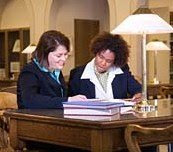Why I like tutoring refugees
by Ann Lockhart
Tutoring refugees has been a very satisfying and absorbing volunteer activity for me since my early retirement. Refugees really need the help to function here, not only with English, but also with daily life challenges like doctor’s appointments, deciphering junk mail, telemarketers, making appointments, filling out forms, etc.
Just as they learn the basics of the language and American culture, I always learn a lot about them, their country, culture and food. Many have stories of political discrimination, torture and displacement. Unfortunately, they can’t explain much of their past until they learn more English.
Having an ongoing personal relationship with each refugee has been really important, interesting and challenging for me. It makes me realize how very fortunate we Americans are. We think we are not rich, but we have so much more than any of them do.
After their traumatic departure from their homeland, refugees come to the U.S. exhausted, but hopeful about starting a new life in one of the richest countries of the world. Then reality sets in. They have to learn so much so fast, starting with the money, the transportation, getting a job, shopping for basics and paying back the loan for their long flight to the U.S. They also get a small apartment with mismatched furniture and very basic supplies.
A man and his wife from Sudan who later lived in Egypt were my first refugee students. He had been a self-educated magazine publisher in Khartoum, and was a political prisoner for 10 years. I was really, really nervous about meeting them, and I think they were just as nervous. But we all relaxed as in-home refugee coordinator Sharon McCreary broke the ice and introduced us. I continued meeting with them for several years, watching their children grow, learn English, attend school and gradually begin to call Denver home.
The Sudanese family was absolutely thrilled when I took them to the Denver Art Museum to see the Cezanne exhibit and again absolutely excited when I got some free tickets to take them to the Denver Symphony. I also took them to see the Glendale fireworks display July 3rd and Sunday night summer concerts at City Park.
My second assignment was tutoring a woman from Iraq with a small child, whose husband went back to Iraq as a translator to the U.S. Army during the war there. Often our English lessons were interrupted by a child’s demands, cries or interruptions. I learned a lot about Iraq and the war there.
She worked really hard to study for her citizenship test, asking me to go over and over the questions weeks before her scheduled meeting. I took her to the office for her test, which consisted of only 10 questions. To her great relief, she did very well. Attending the citizenship ceremony with many other refugees with their friends and families was a really moving experience for me.
Next was a Somali Bantu woman who left an abusive marriage, taking her baby boy with her. Little by little her traumatic life story came out. Her father was a general, and her mother a shopkeeper, but their lives all changed dramatically when warlords took over the government. Her entire extended family is scattered in various countries. She eventually went to St. Louis, Missouri, hoping to get a job and start over.
 A woman from Bhutan, whose family was forced to leave that country for neighboring Nepal, is my current assignment. Her two little girls run in and out, and family members come in and out as we try to focus on the English lessons. Her neighbor asked if she could join us, so now we three work together every week.
A woman from Bhutan, whose family was forced to leave that country for neighboring Nepal, is my current assignment. Her two little girls run in and out, and family members come in and out as we try to focus on the English lessons. Her neighbor asked if she could join us, so now we three work together every week.Preparing lessons does take some time, but I know the better I prepare, the better it goes. With the Picture dictionary, flash cards, workbooks, paper, pencils and whatever else I can come up with, we keep on working.
It’s been fun for me to share with all of them what I love about Denver and the United States. It takes time for us to communicate well about more difficult, abstract issues, going beyond pictures, gestures and simple words.
I highly recommend in-home tutoring as a very satisfying volunteer activity.
Photo courtesy of Ann Lockhart










No comments:
Post a Comment